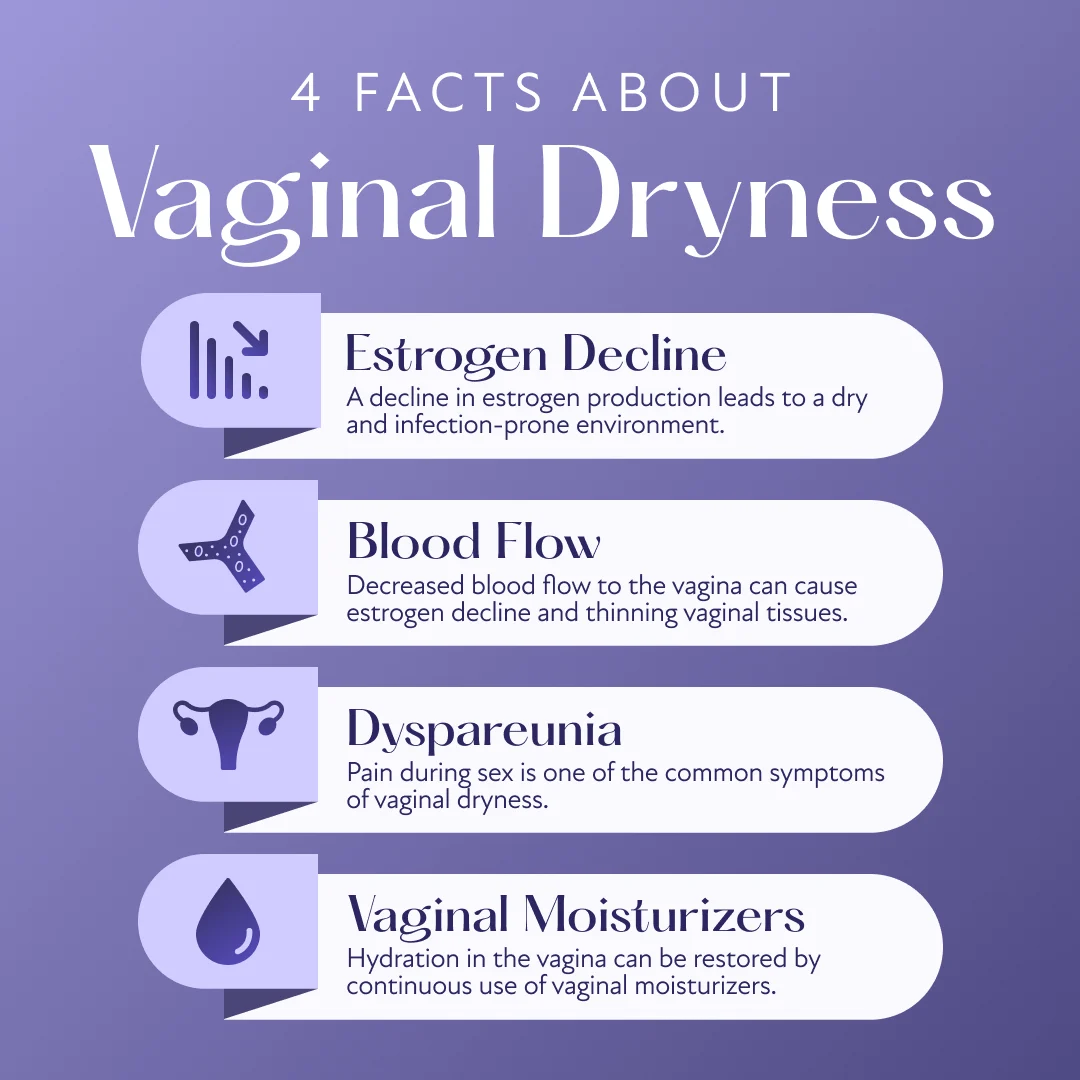Vaginal dryness can affect women at any age, but it becomes particularly prevalent during the menopausal transition. This condition is often associated with painful intercourse and urinary incontinence. The North American Menopause Society (NAMS) classifies these symptoms, triggered by a decrease in estrogen levels, as genitourinary syndrome of menopause (GSM).
While hot flashes and other menopausal symptoms often diminish over time, vaginal dryness persists due to physical changes in the vaginal tissues. These tissues become thinner, drier, and less flexible due to estrogen loss, significantly impacting quality of life. Despite its prevalence, 75% of women with vaginal dryness are hesitant to seek help. This reluctance can stem from embarrassment or the belief that these symptoms are a natural part of aging.1
It's important for women to seek help for GSM, as it can persist and impact their quality of life. Addressing these symptoms with a healthcare professional can lead to effective treatment and improve overall quality of life.
What are vaginal dryness and vaginal atrophy?
Vaginal dryness and vaginal atrophy are interconnected conditions. The walls of the vagina are coated with a thin layer of moisture. This moisture, secreted by the vaginal wall cells, aids in sperm survival and travel and reduces friction during sexual intercourse. However, as estrogen production declines with menopause, vaginal secretions diminish, leading to vaginal dryness.2

Symptoms of Vaginal Dryness During Menopause:
Irritation, burning, or itching in the vagina
Lowered sex drive
Post-sex bleeding
Recurring urinary tract infections
Vaginal atrophy, which affects 50%–60% of postmenopausal women, remains a silent epidemic, as many women often hesitate to seek help for their symptoms.1 The initial sign of this condition is a decrease in lubrication (dryness), often observed during intercourse. Other symptoms include itching or burning in the vagina and distressing urinary symptoms like urine leakage or inability to hold urine.
What are the causes of vaginal dryness during menopause?
Estrogen is crucial for maintaining the vagina's lubrication, elasticity, and thickness. As estrogen levels decline during the menopausal transition, it can result in thinning, drying, and inflammation of the vaginal walls.2
Several other associated factors may also contribute to vaginal dryness:
Smoking cigarettes
Depression
Stress
Immune system disorders
Certain cancer treatments
How can women treat vaginal dryness during menopause?
Low-dose local estrogen, like vaginal estrogen cream, can improve dryness and discomfort during sexual activity. It does so by restoring normal vaginal bacteria (vaginal flora); increasing vaginal moisture, through improved growth of the vaginal lining (vaginal epithelium); encouraging the growth of tiny blood vessels (capillaries); and enhancing the health of the vaginal lining (maturation index of the vaginal epithelium). FDA-approved products include vaginal creams, estradiol tablets or inserts, and vaginal rings.3
Here are additional dos and don'ts to help manage vaginal dryness during menopause:3
Dos
Use vaginal lubricants: They reduce discomfort and enhance pleasure by decreasing friction during sexual activity.
Apply vaginal moisturizers regularly: Regular use of vaginal moisturizers, applied several times a week, helps maintain vaginal moisture and alleviate symptoms of GSM.
Engage in regular sexual stimulation: Sexual activity, whether with a partner, alone, or using a device like a vibrator, promotes vaginal blood flow and secretions, improving overall vaginal health.
Try vaginal dilators: They help stretch and enlarge the vagina if it has become too short or narrow or if involuntary tightening occurs. However, it’s best to use them with guidance from a doctor or sex therapist.
Practice pelvic floor exercises: Strengthening weak pelvic floor muscles and relaxing tight ones through exercises like Kegels can improve vaginal health and manage incontinence. Kegel exercises involve lifting, holding, and then relaxing the pelvic floor muscles. To find these muscles, practice stopping the flow of urine while sitting on the toilet. Start with a few repetitions and gradually increase the duration and number of exercises in each s
ession.4
Consider vaginal dehydroepiandrosterone (DHEA): This is an insert placed in the vagina that improves dryness and discomfort during sexual activity.
Systemic estrogen therapy: For those experiencing hot flashes and vaginal dryness, systemic estrogen therapy can be beneficial. If only vaginal symptoms are present, low-dose vaginal hormone treatments are recommended.
Don'ts
Avoid potential
vaginal irritants: It’s best to avoid urinary incontinence pads, scented detergents, and perfumed soaps, as they can inflame sensitive skin.
Refrain from douching: Douching or using washes can disrupt the natural balance of bacteria in the vagina. Also, steer clear of any moisturizers that are not specifically made for vaginal use.
Limit diuretics: Reduce the intake of diuretics, such as alcohol and caffeine, as they can increase vaginal dryness.
Quit smoking: Smoking can exacerbate vaginal dryness, so quitting is beneficial for overall vaginal health.
Be selective with lubricants: Avoid oil-based lubricants when using condoms, as well as lubricants
with flavors, warming properties, or irritating preservatives.
Experiencing menopausal vaginal dryness? Discover if HRT is right for you.
If you’ve entered the menopause transition and are struggling with vaginal dryness, you don’t have to suffer in silence. Take our brief menopause quiz to see if you’re an eligible candidate for HRT. Get started with Winona to take the first step toward feeling better.